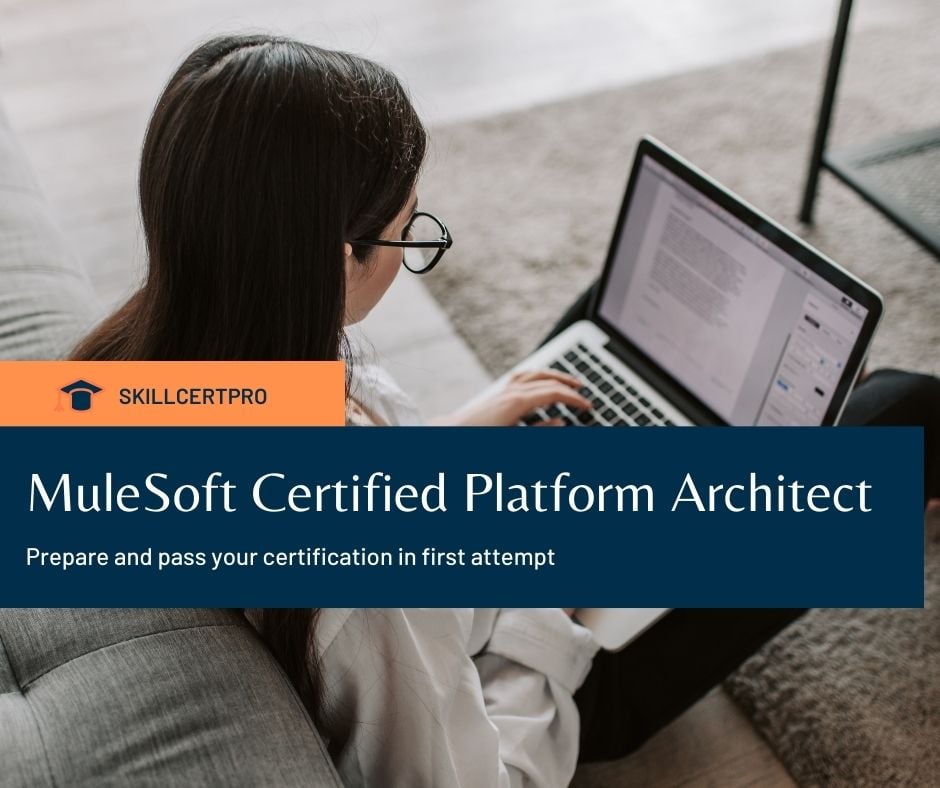MuleSoft Certified Platform Architect Exam Questions (MCPA) Level 1
1. We at SkillCertPro providing with curated 278 MuleSoft Certified Platform Architect Exam Questions 2024 exclusively taken from real exams with difficulty ranging from low to high difficulty.
2. Scoring at least 85% in our MOCK exams will increase your chances of clearing this MuleSoft Certified Platform Architect Exam Questions exam by 100%.
3. It is recommended to go through all Practice tests MuleSoft Certified Platform Architect Exam Questions 2024 and thoroughly read the explanations given to each.
A MuleSoft Certified Platform Architect should be able to define and be responsible for an organization’s Anypoint Platform strategy. The MCPA – Level 1 exam validates that an architect has the required knowledge and skills to direct the emergence of an effective application network out of individual integration solutions following API-led connectivity across an organization using Anypoint Platform. Certified candidates should be able to:
- Optimize and shape the Anypoint Platform deployment in the specific organizational context, working with business, infrastructure, InfoSec, and other teams.
- Define how Anypoint Platform is used in conjunction with other tools and applications in the organization.
- Define the usage of Anypoint Platform and the corresponding organizational and process changes needed to help the platform be sustainable.
- Provide guidance and drive the creation of standards, reusable assets, and automation required for scale and multi-LoB adoption.
It is recommended to have the below knowledge when attempting MuleSoft Certified Platform Architect Exam Questions
Explaining Application Network Basics
- Explain MuleSoft’s proposal for closing the IT delivery gap
- Describe the role and characteristics of the “modern API”
- Define and describe the benefits of API-led connectivity and application networks
- Define outcome-based delivery (OBD)
- Correctly use the terms API, API implementation, API client, API consumer, and API invocation
- Describe the capabilities and high-level components of Anypoint Platform
- ARC:NET Module 1
- ARC:NET Module 2
Establishing Organizational and Platform Foundations
- Describe the purpose and roles of a C4E
- Identify KPIs to measure the success of a C4E
- Given specific organizational requirements, preferences, and constraints, identify all suitable Anypoint Platform deployment options
- Select Anypoint Platform identity management vs client management for the correct purpose
- ARC:NET Module 2
- ARC:NET Module 3
Designing APIs and API Interactions
- Break down functional requirements into business-aligned APIs with effective granularity
- Given a set of APIs and specific preferences and organizational characteristics, recommend the use of an Enterprise Data Model or Bounded Context Data Models
- Identify changes to an API that would require or not require a major version increment
- When asynchronous execution of API invocations is needed, select when to appropriately use polling or callbacks
- Identify idempotent HTTP methods and HTTP-native support for optimistic concurrency
- Describe the creation and publication of reusable API-related assets using RAML and Anypoint Platform components
- ARC:NET Module 4
- ARC:NET Module 6
- Bounded Context
- Why You Should Avoid a CDM
- Canonical Data Models & Microservices
- HTTP/1.1: Semantics and Content
- HTTP/1.1: Caching
- Semantic Versioning 2.0.0
- Semantic versioning of REST APIs?
Following API-Led Connectivity
- Identify appropriate APIs to implement a business process and assign them to layers of API-led connectivity
- Assign APIs to layers according to ownership, functional focus, and rate of change
- Given specific requirements and organizational characteristics, recommend the most appropriate approach relating the API data model of System APIs to that of their backend system
- ARC:NET Module 2
- ARC:NET Module 4
- ARC:NET Module 6
Governing APIs on Anypoint Platform
- Given specific preferences and constraints, select API policy enforcement with or without API proxies
- Select appropriate API policies to enforce non-functional constraints on API invocations
- Given an API policy with specific characteristics, identify any change required in the corresponding RAML definition
- Given a layer of API-led connectivity, identify API policies that are typically applied to that layer and the scenarios needing custom policies
- Identify which types of APIs and other remote interfaces are or are not amenable to management by API Manager
- ARC:NET Module 5
Controlling Access to APIs
- Describe when and how to pass client ID and secret to an API Describe when and how to pass client ID and secret to an API Describe when and how to pass client ID and secret to an API
- Explain how to register an API client for access to an API version
- ARC:NET Module 5
Delivering APIs
- Describe the automation capabilities of Anypoint Platform for DevOps, CI/CD, and testing
- Compare unit and integration tests and specify where MUnit is best employed
- Explain how to use autodiscovery to link an API implementation to an API instance managed with API Manager
- Specify how and when to promote APIs with API Manager
- Identify when redeployment of API implementations is necessary
- ARC:NET Module 7
- ARC:NET Module 9
- Gatekeeper Enhanced Security Reference
Deploying Mule Applications to CloudHub
- Describe the fundamentals of deployments, networking, and routing on CloudHub
- Select CloudHub worker sizes and configuration as appropriate
- Describe the scenarios for which Object Store should be used with CloudHub
- ARC:NET Module 7
Architecting Performant and Resilient APIs
- Identify the factors involved in scaling API performance
- Identify the differences between the CloudHub Shared and Dedicated Load Balancers
- Identify single points of failure in typical CloudHub usage
- Select strategies that help API clients guard against failures in API invocations
- ARC:NET Module 7
- ARC:NET Module 9
- HYSTRIX Defend Your App
- Let’s talk about Resilience
- Eclipse MicroProfile Fault Tolerance
Monitoring and Analyzing Application Networks
- Identify the components of Anypoint Platform that generate data for monitoring and alerting
- Describe the metrics collected by Anypoint Platform on the level of API invocations
- Describe and select between the options for performing API analytics within and outside of Anypoint Platform
- Specify alerts to define for key metrics of API invocations for all layers of API-led connectivity
- Specify alerts to define for API implementations
- ARC:NET Module 10
How to book the MuleSoft Certified Platform Architect Exam
These are following steps for registering the MuleSoft Certified Platform Architect Exam
- Step 1: Visit to MuleSoft Exam Registration
- Step 2: Sign up/Login to MuleSoft account
- Step 3: Select local centre based on your country, date, time and confirm with a payment method
What is the duration, language, and format of MuleSoft Certified Platform Architect Exam
- Length of Examination: 120 minutes
- Number of Questions: 60
- Passing Score: 70%
- Language: English
- Type of Questions: Single and Multiple Choice
MuleSoft Certified Platform Architect Exam Certified salary
The average salary of a MuleSoft Certified Developer – Level 1 Exam Certified expert in:
- United State – 100,200 USD
- India. – 14,00,327 INR
- Europe – 70,500 EURO
- England – 75,000 POUND
Check out other certifications we offer : https://skillcertpro.com/










Josef Shively –
This was very valuable before the real exam. I was preparing through an online course – and working with Mulesoft in my daily job. But when I saw the exam format, I realised it might not be enough. This is hard and prepares you much better than the course on it’s own. Real life experience is the best but to cover every topic, this is very useful. Passed
Shirley Hadik –
Everything you need to know to pass the MuleSoft Certified Platform Architect exam. Passed this test with no problems. Course has excellent explanations on the correct answer as well as the reason why the other options are incorrect.
Lynda Pearson –
questions were from all areas of MuleSoft Certified Platform Architect and very thoughtful. The review part is superb. you get good overview for all the options which further enhances your understanding. Thanks !! Passed
Qasida Jan –
Very good preparation for the test. Questions are structured in the same format and are indicative of the level of detail you are expected to know. Make sure you look at the explanations for the ones which you did not answer correctly. Passed!
Douglas Tillery –
I purchased this set to practice for my MuleSoft Certified Platform Architect exam and was very happy with my purchase. The content and labs helped me immensely to understand the fundamentals of Mulesoft platform and definitely helped me obtain my certification.